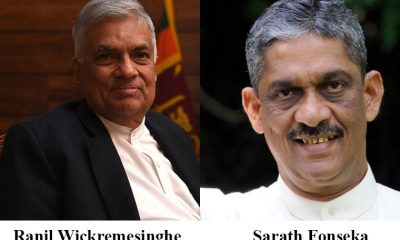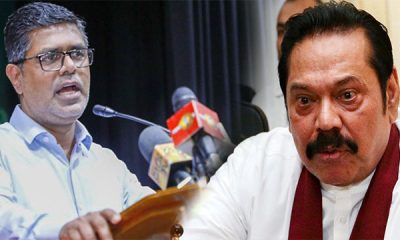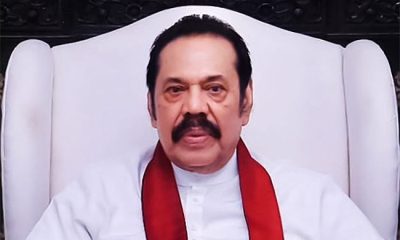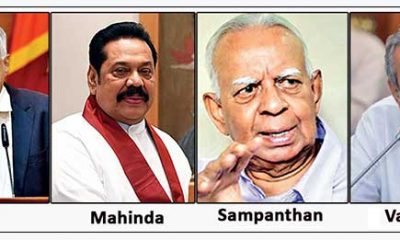News
MR asks Ranil to suspend privatisation projects
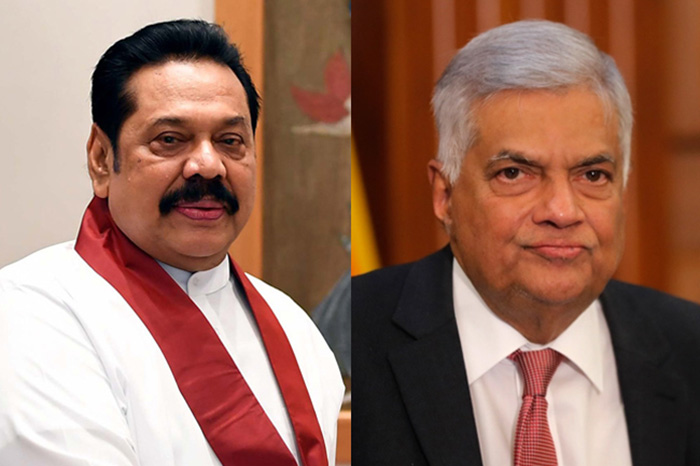
SLPP leader Mahinda Rajapaksa, MP, has asked President Ranil Wickremesinghe to suspend ongoing privatisation projects, pending the conclusion of the presidential polls scheduled for Sept/Oct this year.
Former President Rajapaksa has said in a media statement: “The present government is an interim arrangement formed to run the country for the remainder of former President Gotabaya Rajapaksa’s term. Even the pro-privatisation lobby should realise that the hasty divestiture of state-owned assets at a time like this will not produce the best outcome for the country. Furthermore, the next Presidential Election is only a few months away.
Hence, as a measure to ease the widespread discontent over the government’s divestiture drive, I wish to propose that all moves to sell off stateowned assets or enterprises be postponed until a new government is formed after the next Presidential Election. The new government will then be able to deal with state-owned properties and enterprises in accordance with the mandate they obtain at the election.”
Full text of the statement:
“The government’s plans to sell off certain national assets and state owned enterprises have given rise to discontent among trade unions, political parties and the general public. The present divestiture drive is ostensibly aimed at minimizing govt. expenditure on loss-making state-owned enterprises and meeting certain IMF conditions in that regard. I ruled the country for more than nine years, from November 2005 to January 2015, without ever selling a single state-owned enterprise. In fact, my government actually re-acquired some state-owned enterprises, such as the Insurance Corporation, and Lanka Hospitals, that had been sold off by previous governments, and these enterprises continue to make profits for the state to date.
My government had a pragmatic approach towards state-owned assets and enterprises. If a state-owned enterprise was making profits and providing a good service to the public, we saw no reason to privatize it. At times, a government may take a strategic decision to manage the prices of certain goods or services produced by state-owned enterprises for the overall benefit of the economy or to help low-income earners. The energy sector is a good example of this. There is no government in the world that does not subsidise certain earmarked economic activities.
During my tenure as President, even if some state-owned enterprises made losses due to a government decision to manage prices, our management of the economy resulted in an unbroken nine-year economic boom. We had no difficulty in paying off our debts or meeting the costs of the subsidies we maintained and nobody even spoke of privatisation when I was President. Since the divestiture of certain sectors can have far reaching consequences for the country, especially when foreign parties are involved, this is an issue that has to be approached with caution.
As was resolved at the SLPP May Day rally, any restructuring of state-owned enterprises should take place with maximum transparency, according to a national plan, in a manner consistent with national security and in consultation with the employees.
Having said that, I wish to stress that the trade union sector, for its part, should take a more nuanced approach towards private sector participation in state-owned enterprises. Going by the dictionary definition of privatisation, any involvement of the private sector in the ownership structure or the control of a state-owned asset or enterprise can be characterized as privatisation. However, trade unions should not oppose every attempt to obtain foreign or private sector investment in a government owned enterprise. A pragmatic and non-dogmatic approach to such matters is required.
If there are unutilized government properties or underperforming government enterprises, it makes sense to obtain private sector participation to turn such enterprises around. If a profitable state-owned enterprise needs further investment to add a new feature which cannot be financed by the government, it makes sense to award a share of that enterprise to a private investor in exchange for the investment. If an investor is willing to build a new enterprise from scratch, it makes sense to award shares in that enterprise to the investor so that a new state asset comes into being.
Some political parties have an ideology driven, dogmatic approach to privatization and seeks to privatize anything and everything that can be privatized. Many trade unions also have a similarly dogmatic attitude and tend to oppose any involvement of the private sector in state-owned enterprises. Both these extremes are harmful to the country. Trade unions should regard proposals to obtain private or foreign participation in a state-owned enterprise on a case by case basis and look at the overall benefit of such collaboration to the country.
The only real way national assets and strategically important state-owned enterprises can be safeguarded is by having a government that takes a pragmatic and non-dogmatic approach to such matters. This is why it is important to take note of the fact that when I ruled the country for more than nine years, the economy flourished and there was not even a discussion on the subject of privatisation.”
News
US sports envoys to Lanka to champion youth development

The U.S. Embassy in Colombo welcomed the U.S. Sports Envoys to Sri Lanka, former National Basketball Association (NBA) and Women’s National Basketball Association (WNBA) players Stephen Howard and Astou Ndiaye, from June 8 through 14.
The Public Diplomacy section of the U.S. Embassy said that it would launch a weeklong basketball program intended to harness the unifying power of sports, made possible through collaboration with Foundation of Goodness and IImpact Hoop Lab.
While in Sri Lanka, Howard and Ndiaye, both retired professional basketball players, will conduct a weeklong program, Hoops for Hope: Bridging Borders through Basketball. The Sports Envoys will lead basketball clinics and exhibition matches and engage in leadership sessions in Colombo and Southern Province for youth aged 14-18 from Northern, Uva, Eastern and Western Provinces, offering skills and leadership training both on and off the court. The U.S. Envoys will also share their expertise with the Sri Lanka Basketball Federation, national coaches, and players, furthering the development of basketball in the country. Beyond the clinics, they will collaborate with Sri Lankan schoolchildren to take part in a community service project in the Colombo area.
“We are so proud to welcome Stephen and Astou as our Sports Envoys to Sri Lanka, to build on the strong people-to-people connections between the United States and Sri Lanka,” said U.S. Ambassador Julie Chung. “The lessons that will be shared by our Sports Envoys – communication, teamwork, resilience, inclusion, and conflict resolution – are essential for leadership development, community building, equality, and peace. The U.S. Sports Envoy program is a testament to our belief that sports can be a powerful tool in promoting peace and unity.”
News
Rahuman questions sudden cancellation of leave of CEB employees

SJB Colombo District MP Mujibur Rahuman in parliament demanded to know from the government the reasons for CEB suspending the leave of all its employees until further notice from Thursday.
MP Rahuman said that the CEB has got an acting General Manager anew and the latter yesterday morning issued a circular suspending leave of all CEB employees with immediate effect until further notice.
“We demand that Minister Kanchana Wijesekera should explain this to the House. This circular was issued while this debate on the new Electricity Amendment Bill was pending. There are many who oppose this Bill. The Minister must tell parliament the reason for the urge to cancel the leave of CEB employees,” the MP said.However, Speaker Mahinda Yapa Abeywardena prevented Minister Wijesekera responding to the query and said that the matter raised by MP Rahuman was not relevant.
News
CIPM successfully concludes 8th Annual Symposium

The Chartered Institute of Personnel Management (CIPM) successfully concluded the 8th Annual CIPM Symposium, which took place on 31st May 2024. Themed “Nurturing the Human Element—Redefining HRM in a Rapidly Changing World,” the symposium underscored the pivotal role of human resource management (HRM) in today’s dynamic global landscape. Since its inception in 1959, CIPM has been dedicated to advancing the HR profession through education, professional development, and advocacy, solidifying its position as Sri Lanka’s leading professional body for HRM.
Ken Vijayakumar, the President of the CIPM, graced the occasion as the chief guest. The symposium commenced with the welcome address by the Chairperson, Prof. Arosha Adikaram, followed by the Web Launch of the Symposium Proceedings and Abstract Book by the CIPM President. The event featured distinguished addresses, including a speech by Chief Guest Ken Vijayakumar, President of CIPM, and an address by Guest of Honor Shakthi Ranatunga, Chief Operating Officer of MAS Holdings Pvt. Ltd., Sri Lanka.
The symposium also featured an inspiring keynote address by Prof. Mario Fernando, Professor of Management and Director of the Centre for Cross Cultural Management (CCCM) at the University of Wollongong, Australia.
Vote of Thanks of the inauguration session was delivered by Dr. Dillanjani Weeratunga, Symposium Co-chair.
The symposium served as a comprehensive platform for researchers to present their findings across a wide range of critical topics in HRM. These included Cultural Diversity and Inclusion, Talent Development and Retention, Ethical Leadership and Corporate Social Responsibility, Adapting to Technological Advancements, Mental Health and Well-being at Work, Global Workforce Challenges, Employee Empowerment, and Reskilling and Upskilling.
The plenary session was led by Prof. Wasantha Rajapakse. Certificates were awarded to the best paper presenters during the valedictory session, followed by a vote of thanks delivered by Kamani Perera, Manager of Research and Development.
The annual symposium of CIPM was a truly inclusive event, attracting a diverse audience that spanned undergraduates, graduates, working professionals, research scholars and lecturers. This widespread interest highlights the symposium’s significance in the field of HRM, offering a unique opportunity for everyone to network and learn from scholarly brains.The CIPM International Research Symposium was sponsored by Hambantota International Port, Sri Lanka Institute of Information Technology (SLIIT), E B Creasy & Co. PLC, and Print Xcel Company.


